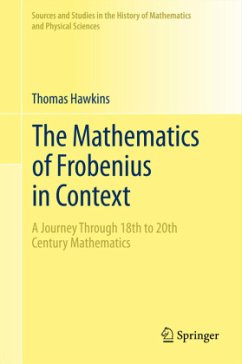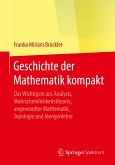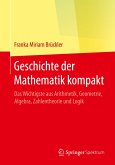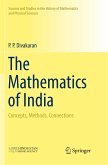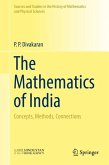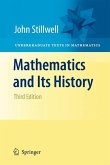Frobenius made many important contributions to mathematics in thelatter part of the 19th century. Hawkins here focuses on his work inlinear algebra and its relationship with the work of Burnside, Cartan,and Molien, and its extension by Schur and Brauer. He also discussesthe Berlin school of mathematics and the guiding force of Weierstrassin that school, as well as the fundamental work of d'Alembert,Lagrange, and Laplace, and of Gauss, Eisenstein and Cayley that laidthe groundwork for Frobenius's work in linear algebra. The bookconcludes with a discussion of Frobenius's contribution to the theoryof stochastic matrices.
From the reviews:
"The author has succeeded admirably in describing the mathematical work of Frobenius. ... this book is an excellent contribution to the mathematical literature ... it is, or should be, a role model for historical writing, and for bringing the mathematics of the recent past back to life." (Franz Lemmermeyer, zbMATH, Vol. 1281, 2014)
"The author has succeeded admirably in describing the mathematical work of Frobenius. ... this book is an excellent contribution to the mathematical literature ... it is, or should be, a role model for historical writing, and for bringing the mathematics of the recent past back to life." (Franz Lemmermeyer, zbMATH, Vol. 1281, 2014)
From the book reviews:
"I highly recommend Hawkins' book. It is very mathematical all the way through. ... Hawkins' work is extraordinarily useful. It allows the mathematical community, even the great majority of us who do not read German well, to understand the work of the very important mathematician Frobenius. The great length of the book is essential to the book's success." (David P. Roberts, MAA Reviews, October, 2014)
"The author has succeeded admirably in describing the mathematical work of Frobenius. ... this book is an excellent contribution to the mathematical literature ... it is, or should be, a role model for historical writing, and for bringing the mathematics of the recent past back to life." (Franz Lemmermeyer, zbMATH, Vol. 1281, 2014)
"I highly recommend Hawkins' book. It is very mathematical all the way through. ... Hawkins' work is extraordinarily useful. It allows the mathematical community, even the great majority of us who do not read German well, to understand the work of the very important mathematician Frobenius. The great length of the book is essential to the book's success." (David P. Roberts, MAA Reviews, October, 2014)
"The author has succeeded admirably in describing the mathematical work of Frobenius. ... this book is an excellent contribution to the mathematical literature ... it is, or should be, a role model for historical writing, and for bringing the mathematics of the recent past back to life." (Franz Lemmermeyer, zbMATH, Vol. 1281, 2014)

